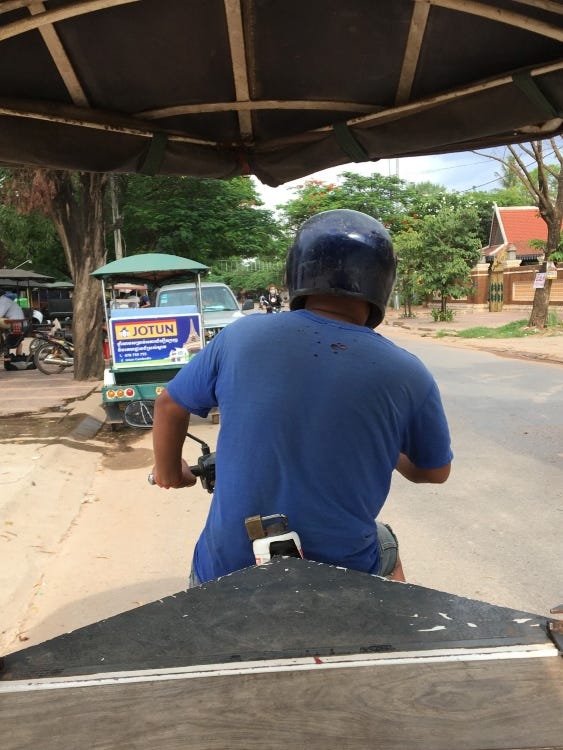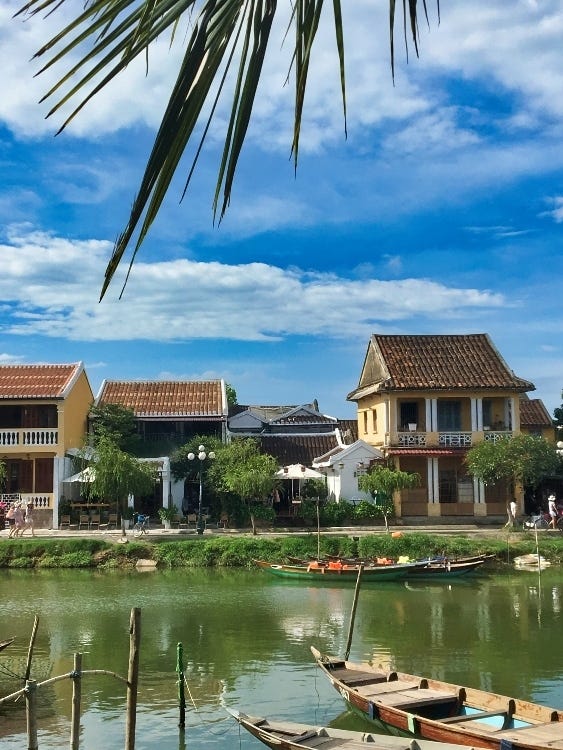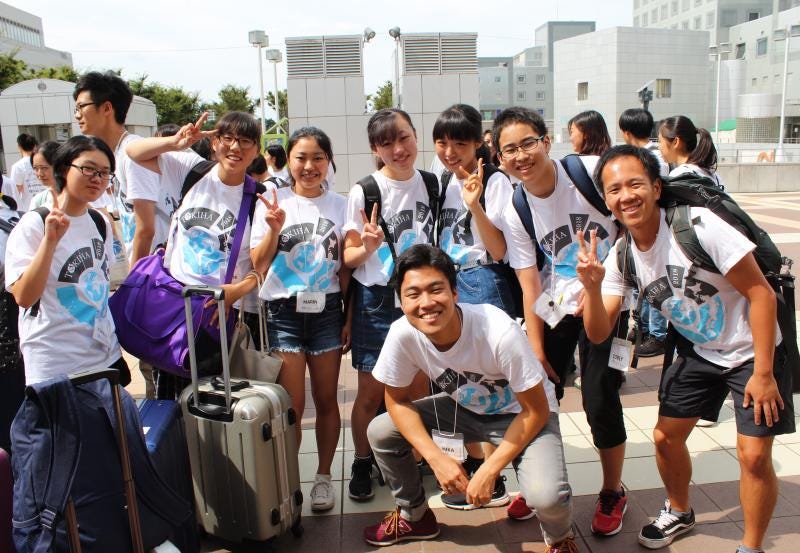Why I Travel
Backpacking in Asia. Remembering Anthony Bourdain. The human connection.
Travel has been more than just a hobby in the past five years. It's been a constant, significant, and recurring thread woven into my life.
I've been living in different cities for a month—from the concrete jungle of New York to the sun-soaked boulevards of Los Angeles and, recently, the neon heartbeat of Tokyo.
But as I live through this whirlwind, I find the need to pause and remind myself: Why?
Why do I travel? Why is it so important to me, and what is the purpose of all this?
When that need arises, I look in the rearview mirror to assess what has already passed and what the facts are.
I look for milestones—the pivotal trips and experiences that made a real difference and have deeply carved my worldview and purpose.
I'm often led back to the starting point.
Five years ago, I hopped on a one-way flight from San Francisco to Asia, embarking on my "Post Grad Backpacking Trip."At the time, I didn't know when I'd return or what I was getting myself into.
As it turned out, the ups and downs were far from what I had expected, and then things took a sharp turn.
Ten days after throwing my graduation cap in the air, I renewed my passport and stared at my newly-purchased backpack.
This backpack, my sole luggage and only companion that joined me on this trip was filled with t-shirts and shorts, a padlock for hostel lockers, and a bottle of activated charcoal as an insurance policy against questionable street food.
I might have packed like a seasoned explorer, but my travel experience was practically non-existent.
The world as I knew it was framed by a lifelong residency in the San Francisco Bay Area with occasional trips across California for Disney-related excursions or camping in state parks.
My real passport to the world was the Travel Channel. Post-dinner entertainment was a global exploration guided by the charismatic trio of Adam Richman, Andrew Zimmern, and Anthony Bourdain.
Night after night, Adam introduced me to the fieriest dishes and ludicrous portions across America. Andrew dared me to experience bizarre delicacies, ranging from rotten camel meat in the Middle East to exotic bugs and insects in remote corners of the globe. Then there was Tony, who brought the world's many flavors to my living room, often narrating tales from a simple plastic stool, hunched over a hearty bowl of noodles.
As a kid, they were my heroes and showed me parts of the world I thought I would never see. It never occurred to me that I’d get to follow in their footsteps.
So, I was on the cusp of real-life adulthood in my senior year in college, overwhelmed by the world ahead of me. I didn't know what to do.
Seeking some wisdom, I reached out to alums, late into their 20s or 30s and well-off in their career. Their shared advice was simple and always an immediate response—take time to travel.
While my classmates, business majors at UC Berkeley, were securing roles in accounting, banking, and consulting, I was entertaining an entirely different proposition.
My friend's offer to teach English at his summer camp startup in Japan—unpaid, but with the promise of a covered flight—seemed the most fun.
With two months to spare before teaching and a modest bank balance from juggling jobs throughout college, I saw a window of opportunity.
I was green, had never traveled solo or outside the U.S., and calculated I could last on a shoestring budget of $50 a day. Yet, this felt like a once-in-a-lifetime chance, and I didn't know if I'd ever be able to travel again.
With all the confidence I could muster, and in a calculated risk, I jumped straight into the deep end of the famed "Banana Pancake Trail," a popular backpacker's route through South East Asia.
My travels were loose and never bound by my next flight and hostel, often booking things the same day as departure.
I followed the spirit of many backpackers before me and moved when either struck by boredom or the impulse to chase the thrill of the next city.
In two weeks, I blazed through six cities, each with a fresh stamp on my passport: Hong Kong, Macau, Bangkok, Phnom Penh, Siem Reap, then Ho Chi Minh City.
This whirlwind itinerary might sound intense, but it was the norm amongst my fellow backpackers, some of whom dashed through ten cities in the same span.
I saw sights I had only read about or seen on TV and met interesting people from around the world.
Back then, I started writing daily, knowing I couldn't remember every moment or every person I met.
Initially, I thought of publishing my adventures under the handle "Wandering Grad," but a grim reality lay under the shimmering veil of wanderlust.
The exhaustion and overwhelming stimuli of travel, the creeping anxiety and the disorientation of being a new nomad in uncharted lands—all had quietly amassed in the initial weeks of my journey.
I was a tourist, clutching my backpack in unfamiliar territories, afraid of being scammed or robbed. There were whispered tales of backpackers vanishing without a trace. This foreign land, at times, felt hostile, and I already missed home.
I discovered social media's glossy portrayal of travel destinations was an illusion.
The exaggerated euphoria of Instagram influencers—big and broad smiles, hands thrown into the air with double peace signs—felt far removed from my experience. Whatever they had, I didn't.
I, too, dutifully captured pictures, hopping from one sight to another. Yet, at the end of each day, my photos echoed a hollowness, a disconnection from the places I had visited.
At Angkor Wat, my tuk-tuk driver asked, "Why do tourists travel thousands of miles to take a photo and leave?"
His simple question left a profound impression on me, and I reevaluated my relationship with travel.
The $8 per night hostels I bunked at were a steal. Clean, organized, and lively, with the bonus of mouth-watering banana pancakes (another reason why it's called the Banana Pancake Trail) served with exotic fruits like dragonfruit, mango, and guava each morning.
Yet, the transient nature of fast friendships formed in these hostels became exhausting. The cycle of meeting people, bonding, and parting ways within 24 hours was a constant emotional drain.
As an Asian traveler, I often found myself at the receiving end of local languages, with the locals assuming I was one of them. But my English responses left us both in confusion. I was a part and a part of the sea of faces across Asia.
I began to shut down silently.
There were days when my interactions were minimal; I uttered fewer than a hundred words, and sometimes, none.
The overwhelming sensations of anxiety, exhaustion, and loneliness seeped deeper into me. I had underestimated the realities of such a trip and contemplated returning home. But with my commitment to teaching English in Japan and a shrinking travel fund, I was stranded.
Stuck, I trudged on, drifting from one place to another.
The romantic notion of "wandering" began to sour, leaving a bitter aftertaste in my mouth.
I lost sight of why I was there and felt alone and disconnected, adrift in a sea of unfamiliarity and uncertainty.
But in an unexpected twist, my journey took a turn.
Vietnam was initially off my itinerary. Its status as a communist country and the need for a VISA were deterrents.
However, I found myself drawn to Vietnam, largely thanks to the glowing endorsement from one person—Anthony Bourdain. His love for the country, evident in his writing and TV shows, was infectious.
Of all the countries he's been to, he seemed happiest there.
I vividly remember an episode where Bourdain visited Hoi An, an ancient beach town in Central Vietnam, and spoke fondly of possibly buying a house there.
Bourdain was a one-of-a-kind storyteller, someone I deeply admired.
His approach to travel was strikingly different from the boundless enthusiasm of Adam Richman or the family-friendly format of Andrew Zimmern's shows.
He was charismatic, respectful, and wonderfully rebellious—a blend of irreverence and intelligence that was uniquely him. Bourdain's commentary was always candid, witty, insightful, and, most importantly, real.
His knack for connecting people, food, places, and culture was exceptional. He made us realize that despite our geographies, we're all part of the same fabric, bound by shared experiences and stories.
He was a hero to me and a beacon of qualities I aspired to.
In Hoi An, I was staying at the Cheerful Hostel. Living up to its name, the host was ebullient, welcoming me and a British couple with a homecooked meal while bidding farewell to depart travelers.
Despite her attempts to uplift my spirits, I still had a gloomy gaze as she asked about my well-being. She suggested a day at the beach and lent me her bike, hoping the sea breeze, warm turquoise waters, and bright sun might lift my spirits—but my melancholy persisted.
That was June 8th, 2018.
As I returned to the hostel in the evening, I ran into the British couple who hurried towards the TV.
They shared with me the devastating news—Anthony Bourdain had committed suicide.
My numbness seemed to mute the shock, and instead of panicking, I sat down, patiently waiting for more news. Only snippets of reactions from those who knew Bourdain aired.
The following day, I awoke with a new resolve.
I was in this country, in this town, because of Bourdain. His fascination for the place had led me here, and I still yearned to experience what he had.
I wanted to honor him, to pay tribute to the man who had indirectly guided my journey.
An idea started to form, somewhat wild yet compelling.
What if, in honor of Bourdain, I continued my journey through Asia as if he were here, experiencing the places and cultures he loved?
"If I'm an advocate for anything, it's to move. As far as you can, as much as you can. Across the ocean, or simply across the river. The extent to which you can walk in somebody else's shoes—or at least eat their food—it's a plus for everybody. Open your mind. Get up off the couch. Move."
- Anthony Bourdain
His words reverberated in my mind, a beacon guiding my next steps.
A flicker of curiosity ignited and seizing this newfound urgency, I stepped out of the hostel into the radiant day, eager to explore the town and cast aside the shroud of melancholy.
Hoi An unfolded around me, a patchwork of preserved French colonial homes, temples, and tea warehouses suspended in time. Each step I took through its ancient streets felt like traversing through generations of history and culture.
Once shrouded in a false sense of danger, these foreign streets weren't so intimidating anymore. In fact, the light palette of gold and tan buildings glowed from the morning sun.
I found a new buoyancy in my stride, echoing the confident strut of Bourdain. The way he carried himself across cities from East to West, and his cool-headed confidence, all seeped into my posture.
A sense of purpose emerged within me.
I was hungry—not just for food but for experiences, connections, and stories.
My first stop was Banh Mi Phuong.
The sandwich shop, a bustling hole-in-the-wall operation teeming with dexterous women, their hands a blur while preparing the town's best banh mi, had grown from a small food stall thanks to Bourdain's visit and endorsement.
Standing in the long queue, I reflected on the role food played. It was no longer just about gratifying hunger but about connecting with people, cultures, and places.
Food wasn’t just about me.
The Vietnamese sandwich was a testament to the country's culinary heritage—an enduring legacy of resilience and adaptation during French colonial rule.
The light, crisp baguette cradled a constellation of flavors and textures—lightly smoked ham, pickled slices of carrots and cucumbers, fresh cilantro, lettuce, and a tangy, mildly spicy chili sauce.
The secret ingredients and angel-like touches were a spread of pate, an unexpected fusion of pork liver, seasoning, spices, and a fried egg—a golden touch of richness.
I've had banh mi before, but as I ate outside the storefront with the dozen other patrons and thought about my sandwich, I realized that food tasted better now.
Evening descended, casting long shadows over the old town, and the streets came alive with vibrant, colorful lanterns strung throughout the storefronts, river walk, and alleys.
Asia hums differently at night. A carnival-like buzz of laughter, conversation, and footfalls replaced the daytime quiet.
As I walked through the streets, I realized loneliness was an inevitable companion on this journey. To be a constant outsider looking in and stepping directly into the unknown can invite it.
I needed to embrace the nuances of this solo trip.
Drawn by a fragrant aroma and the warm smile of a lady ladling bowls of cao lau, I found myself at the local market.
The dish was a local specialty, made from the same well water across generations.
As I sat among the locals, savoring the same bowl Bourdain had featured on his show, a wave of contentment washed over me.
Cao lau—a comforting blend of chewy noodles, savory broth, fresh herbs, and bean sprouts—became more than a meal. It was a popular and shared dining experience with those around me under the same moonlight by the same river.
I reflected that every person at the tables, each likely bearing their quiet pains and humble joys, myself included, had a shared connection in the simple act of eating.
The smiles and joyful experience of taste that everyone experienced formed the invisible threads that bridged our disparate lives.
It made the world a little less daunting and a little more familiar. I was still alone on my trip but felt a lot less lonely.
The new dimension of food and travel I had discovered was not just about exploration or indulgence but about connection.
After Hoi An, my journey continued to trace Bourdain's footsteps, frequently leading me to lively dinner tables shared with locals, often sitting on plastic stools and with lots of drinks—it was a cornerstone of the spirited and welcoming culture in Vietnam.
In Hanoi, I joined the locals in their daily ritual of savoring Bia Hoi (literally "fresh beer"), each guzzle accompanied by loud cheers. A hiking trip in Northern Vietnam introduced me to a warm circle of long-term international friends and offered an intoxicating taste of rice wine with local hemp farmers. I even found myself on a moped, navigating past waving rice paddy farmers in the countryside and weaving through a myriad of city traffic.
I began to experience the type of travel I sought—a kind of travel where, given a dash of luck, I could genuinely step into someone else's shoes and experience something unique and new.
My Post Grad Backpacking Trip had ended after four transformative months, a slew of more adventures across Asia, and after teaching English in Japan.
Travel, for me, became more than a sequence of visited places—it became a portal to human connection, a journey to the heart of culture, and a path to discovery.









